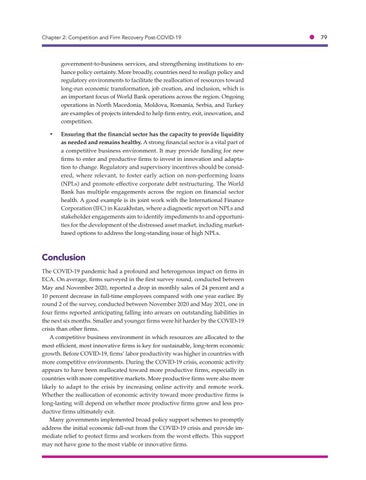Chapter 2: Competition and Firm Recovery Post-COVID-19
government-to-business services, and strengthening institutions to enhance policy certainty. More broadly, countries need to realign policy and regulatory environments to facilitate the reallocation of resources toward long-run economic transformation, job creation, and inclusion, which is an important focus of World Bank operations across the region. Ongoing operations in North Macedonia, Moldova, Romania, Serbia, and Turkey are examples of projects intended to help firm entry, exit, innovation, and competition. •
Ensuring that the financial sector has the capacity to provide liquidity as needed and remains healthy. A strong financial sector is a vital part of a competitive business environment. It may provide funding for new firms to enter and productive firms to invest in innovation and adaptation to change. Regulatory and supervisory incentives should be considered, where relevant, to foster early action on non-performing loans (NPLs) and promote effective corporate debt restructuring. The World Bank has multiple engagements across the region on financial sector health. A good example is its joint work with the International Finance Corporation (IFC) in Kazakhstan, where a diagnostic report on NPLs and stakeholder engagements aim to identify impediments to and opportunities for the development of the distressed asset market, including marketbased options to address the long-standing issue of high NPLs.
Conclusion The COVID-19 pandemic had a profound and heterogenous impact on firms in ECA. On average, firms surveyed in the first survey round, conducted between May and November 2020, reported a drop in monthly sales of 24 percent and a 10 percent decrease in full-time employees compared with one year earlier. By round 2 of the survey, conducted between November 2020 and May 2021, one in four firms reported anticipating falling into arrears on outstanding liabilities in the next six months. Smaller and younger firms were hit harder by the COVID-19 crisis than other firms. A competitive business environment in which resources are allocated to the most efficient, most innovative firms is key for sustainable, long-term economic growth. Before COVID-19, firms’ labor productivity was higher in countries with more competitive environments. During the COVID-19 crisis, economic activity appears to have been reallocated toward more productive firms, especially in countries with more competitive markets. More productive firms were also more likely to adapt to the crisis by increasing online activity and remote work. Whether the reallocation of economic activity toward more productive firms is long-lasting will depend on whether more productive firms grow and less productive firms ultimately exit. Many governments implemented broad policy support schemes to promptly address the initial economic fall-out from the COVID-19 crisis and provide immediate relief to protect firms and workers from the worst effects. This support may not have gone to the most viable or innovative firms.
● 79



